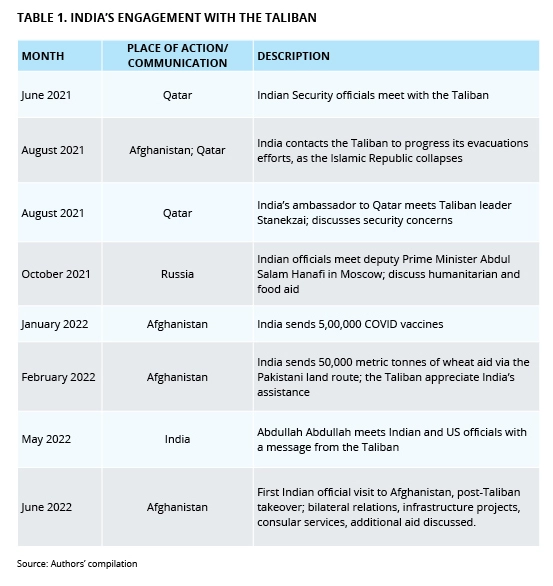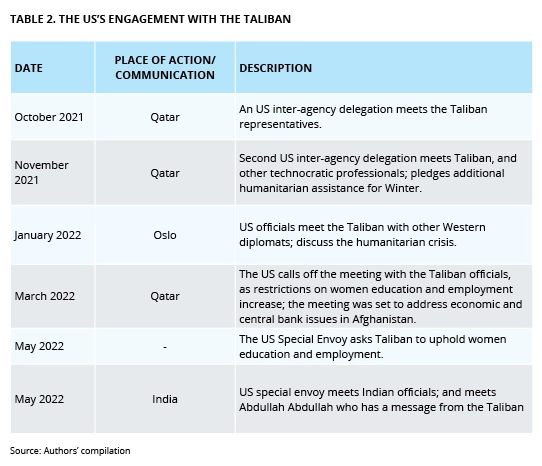The India-US Partnership: Strategic Convergences And Divergences In Afghanistan
In a joint statement in April, both India and the United States (US) demanded the Taliban to respect human rights and women rights, and deter Afghanistan from promoting or harbouring terrorists. A month later, the US Special Representative for Afghanistan held high-level engagements with senior Indian diplomats. Officials from both the countries also met Abdullah Abdullah—who had carried a special message from the Taliban with him. Following it, on 2 June 2022, India marked its first official visit to Afghanistan after the Taliban took over the country.
In recent months, both, India and the US have begun to realise and act on their converging strategic interests in the Taliban-governed Afghanistan. Both the states have continued to pragmatically engage with the Islamic Emirate. While diplomatic recognition is off the table, for now, they hope their limited engagement could achieve their national interests, incentivise the Taliban to reform, and prevent Afghanistan from descending into complete chaos. Nonetheless, there are challenges to cooperation as divergences exist in their strategies on Pakistan and Iran. Differing threat perceptions from transnational and regional terrorist groups have limited the scope of counterterrorism cooperation.
Convergence of strategic interests:
For India, threats emanating from Afghanistan are a vital concern. Lashkar-E-Taiba (LeT) and Jaish-E-Mohammad (JeM) continue to operate from Nangarhar and Kunar provinces. Drugs and weapons trafficking that is happening through India’s maritime routes and the golden crescent has created apprehensions of even fuelling further unrest in Kashmir. Thus, India continues to be worried about a tentative state failure in Afghanistan, the misuse of its ungoverned spaces, or even Pakistan’s influence within some factions of the Taliban.
By directly engaging with the Taliban, India is hoping to promote a stable and inclusive government in Afghanistan, uphold its human and women’s rights, and strengthen its capabilities. Starting from June 2021, India had engaged with various Taliban leaders on several occasions—asking them to respect Indian interests and sensitivities (refer to Table 1). They had also expected the Taliban to facilitate India’s people-centric approach in Afghanistan, as seen with its vaccines and humanitarian assistance. In May, India was also exploring options to reopen its embassy in Kabul to better facilitate Afghanistan’s development and humanitarian needs. Its visit and inspection of Indian projects and initiatives in June 2022—also indicates a likely continuation of the traditional economic, humanitarian, and development assistance.

On the other hand, the US’ interest in Afghanistan is rather normative and status-oriented. After having spent two decades and trillions of dollars, the US cannot afford Afghanistan being a failed state. A failed state might undermine the US’ status as a major power and its material and normative capabilities to promote and protect human rights across the world. It, thus, desires to preserve its gains made in Afghanistan over the past two decades. This includes human and women’s rights, socio-economic development, limiting extremism and terror-related activities, and promoting regional stability.
These interests have resulted in the US engaging with the Taliban to provide more humanitarian and economic assistance to the country. Such interactions have been happening since October 2021 (refer Table 2). And in return, the US is expecting the Taliban to provide safe passages for Afghans, improve humanitarian access, uphold human and women’s rights, promote inclusive government, and refuse to harbour or promote terrorists.

In sum, both India and the US are embracing similar strategic interests in Taliban-ruled Afghanistan. They are intending to avoid a state collapse and a humanitarian catastrophe in the country, which gives them enough space to cooperate and coordinate. Together, they could assist with intelligence provision and over-the-horizon counterterrorism capabilities, if the Taliban proves themselves worthy and reliable. This coordination could also exert sufficient pressure against the factionalised Taliban.
The US would also need India, considering the latter’s regional presence, and its capability and experience in providing development and humanitarian aid. This will continue to be the case, as the US has no diplomatic presence in the country, and India remains a reliable regional power. India’s recent humanitarian assistance is giving more currency to how the India–US partnership could advance shared goals in Afghanistan.
Divergences in Afghanistan
While India and the US have shared objectives in Afghanistan, deeper cooperation would come with its challenges. In the past, the two countries’ policies have often worked in parallel with each other due to different strategies for Afghanistan.
The primary challenge is accommodating Pakistan. Islamabad’s decades-long support of the Taliban is rooted in maintaining a “strategic depth” allowing Islamist proxies a haven that impedes New Delhi from undermining Islamabad and projecting power in South Asia. Strongly propagated by the Pakistani military, protection from Indian encirclement takes precedence over Pakistan’s broader geopolitical and economic aims. In the past, the American courting of Islamabad and commitment to reducing the Indian footprint in Afghanistan has failed to prevent Pakistan from supporting militant groups, including anti-India groups such as the LeT and the JeM. These groups are central to India’s counterterrorism objectives in Afghanistan as they pose serious security threats.
Even in contemporary times, Pakistan has substantial and direct communications with the Taliban, thus providing the US with an avenue to influence some outcomes in Kabul. This facilitates continuing dependence of the US on its “duplicitous” ally. New Delhi has not hesitated in responding with muscular military might to confront Pakistan’s sponsoring of cross-border terrorism. Under the current Indian government, there have been military raids and aerial attacks on terror camps across the border. Additionally, India along with other member states successfully mobilised multilateral institutions like the Financial Action Task Force (FATF) to scrutinise Pakistan’s support for terrorist groups. Since the Taliban takeover, New Delhi has also actively engaged with regional stakeholders since the fall of Kabul. India has reached out to the Central Asian States and Russia to counter the Chinese footprint in Afghanistan. At the regional level, Indian and US policymakers have contrasting views on the role of Iran in Afghanistan. While India maintains amicable relations with Tehran, the US policymakers are more averse to Iranian involvement.
When it comes to the shared aims of preventing Afghanistan from further harbouring Islamist terrorists and counterterrorism, a closer look reveals that both India and the US are vexed about different groups. For New Delhi, threats largely stem from LeT, JeM, and the Indian Mujahideen. Whereas Washington has focused more on transnational groups in line with the Global War on Terror, such as the Al-Qaeda, the Haqqani Network, and recently the Islamic State Khorasan Province (ISKP), however, convergence is likely to emerge on Al-Qaeda, as in the last three years in has been threatening New Delhi directly.
The divergent threat perceptions have resulted in frictions in the past. In the aftermath of the 26/11 terror attacks in Mumbai, the Indian intelligence community suspected the US to have known more about the nature and magnitude of the attacks than disclosed to New Delhi. Moreover, the delayed conviction of David Headley triggered a diplomatic crisis as Washington’s utilitarian interest overrode its commitment to cooperating with India on counterterrorism.
Considering the interconnectedness between the “mosaic” of terror groups, counterterrorism collaboration between India and the US has been restrained owing to the absence of congruence in policies related to Pakistan and Islamabad pursuing its strategic goal of undoing India with a “thousand cuts” through non-state actors. In the prevailing fluid global security scenario, it is imperative that the two work towards greater institutionalisation of the counterterrorism agenda and development cooperation. India has more potential to contribute to Afghanistan as, like Washington, it desires to enhance Afghan security, political stability, economic growth, and regional integration to wean it away from global jihadists.
